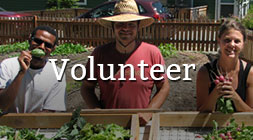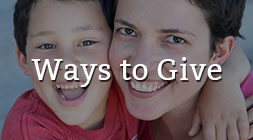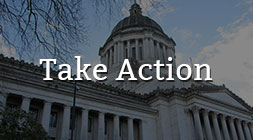In the spring of 1974, a group of neighborhood activists and volunteers responded to growing economic desperation in Seattle’s Fremont neighborhood by launching the Fremont Public Association (FPA). Tapping into the spirit and funding of the federal War on Poverty, they pledged to work for Freedom from Poverty through Action.
In response to neighbors’ immediate needs for food and employment, the FPA started with a food pantry, clothing bank, and job referral service. The agency grew rapidly by asking the community what it needed, then aggressively pursued funding to develop programs and services. It branched out into many areas, including housing, transportation, and youth development. It convened partnerships and coalitions, created innovative service models, and continued to base its advocacy on the input of community members.
In 2007, FPA took a new name, Solid Ground, to reflect how its impacts went well beyond the neighborhood where it started. Today, we continue to partner with our community to develop services and advocacy efforts focused on overcoming barriers to thriving and supporting equitable access to opportunity. We have deep gratitude for all of the staff, volunteers, and supporters who’ve helped build a community where all of our neighbors have opportunities to thrive. See a timeline of some of our agency highlights below.
Solid Ground’s Historical Timeline
 1974
1974
When the quasi-governmental North Seattle Community Service Center got its funding slashed by President Richard Nixon, local Fremont activists – including Rev. Bob Walker, Pat Proulx, and others – formed the Fremont Public Association (FPA). Initial programs included a food bank, job service, and clothing bank. The agency assumed operations of the Fremont Fair to raise funds and awareness.
 1975
1975
Led by Armen Napoleon Stepanian, the FPA created Fremont Recycling Station #1, the nation’s first curb-collected, source-separated recycling program. The program was staffed by youth who needed to perform community service hours. While the service was not available citywide, routes were designed to pick up at the homes of all City Council members as a way to build political influence.
 1978
1978
Initiated the Welfare Advocacy Program – now called Benefits Legal Assistance (BLA) – offering free legal advice and representation for people being unfairly denied their public assistance benefits.
 1979
1979
Began Home Care services helping low-income seniors and adults living with disabilities to remain safely in their homes. During the late 1980s and 1990s, Home Care expanded to serve the earliest victims of the AIDS epidemic. Advocacy through the Home Care Coalition, which FPA started, resulted in the state providing tens of millions of dollars a year in Home Care services.
Launched Housing Counseling, providing technical assistance to help tenants and homeowners avoid eviction or foreclosure to maintain stable housing.
Created Food Resources to work with food distributors and other service providers to coordinate and maximize the effectiveness of Seattle’s emergency food system.
 1982
1982
Opened Family Shelter, providing short-term and extended shelter, including Seattle’s first city-funded motel voucher program north of the ship canal. Family Shelter currently operates 10 units of community-based housing in the north end.
 1983
1983
Developed Broadview Emergency Shelter for women and children experiencing domestic violence (DV) and homelessness. Broadview started in a repurposed school building in Seattle’s north end and moved in 1986 to central Seattle, where it added transitional housing, children’s programs, and legal advocacy services. It’s the only remaining DV shelter in the city that can accept direct referrals for same-day intake.
 1984
1984
Played a key role in organizing the Survival Services Coalition, which later led to the Seattle Human Services Coalition (SHSC), comprised of 280 coalitions, agencies, programs, and individuals committed to helping Seattle/King County residents meet their basic human needs.
Our Fair Budget Action Coalition led the successful Molar Majority Campaign to reinstate dental services for adults living on low incomes after the state cut adult dental benefits in 1982.
 1985
1985
Sponsored implementation of Health Care for the Homeless – King County, providing quality, comprehensive health care for people experiencing homelessness as well as leadership to help change the conditions that deprive our neighbors of home and health.
 1986
1986
Started the independent Seattle Workers Center, creating union jobs and organizing displaced or laid-off workers to protest unfair labor practices (e.g., lockout from unemployment benefits).
Led the effort to pass the Seattle Housing Levy, preserving and creating affordable housing and providing services to help people move beyond shelter. To date, the Levy has funded more than 11,000 affordable homes, downpayment loans to more than 1,000 first-time homebuyers, and rental assistance to more than 4,000 households.
 1987
1987
FPA VISTA John Rochford launched Seattle Personal Transit (SPT), pioneering special transportation services for people with disabilities who can’t access the fixed-route bus system. Renamed Solid Ground Transportation (SGT) in 2013, we are the only nonprofit service provider of Metro Access transportation.
 1988
1988
Fought to raise the Washington state minimum wage and provide the nation’s first-ever indexing of minimum wage to cost-of-living adjustments. Hosted the campaign kickoff for the statewide initiative signature drive at our Fremont Food Bank.
Created the Lettuce Link program, providing Seattle food banks with fresh, organic produce grown in community and backyard gardens.
 1989
1989
Started the MLK VISTA program to build community leadership to fight poverty through National Service. At one time, we managed the state’s largest group of National Service programs, with 150 AmeriCorps and VISTA members in programs focusing on violence prevention, literacy, and helping communities overcome other poverty-related challenges.
1990
Partnered with unions and the Port of Seattle to launch the independent Port Jobs, which creates apprenticeships leading to high-paying construction and other trade jobs for women and minorities in Seattle/King County.
 1991
1991
Operated the King County Long-Term Care Ombudsman Program (LTCOP), providing advocacy for people living in long-term care facilities. In 2012, transitioned LTCOP to the Multi-Service Center to merge with the State Long-Term Care Ombudsman office and improve efficiencies.
Spun off the Low-Income Housing Institute (LIHI), a nonprofit housing developer that has built more than 3,500 affordable housing units throughout Puget Sound.
Created Community Voice Mail (CVM), connecting more than 2,000 people experiencing homelessness and joblessness to housing, jobs, and other resources. In 1993, CVM was recognized by Harvard’s Innovations in State and Local Government Awards Program, which led to replicating CVM in over 40 cities nationwide. As cellphone and internet technology improved, the program rebranded to ConnectUp before discontinuing in 2017.
 1992
1992
Advocated to launch the Washington State Housing Trust Fund, financing a broad range of housing for low-income people throughout the state. The Housing Trust Fund has supported, constructed, repaired or preserved 58,600 affordable housing units.
Partnered in the creation of Common Cents, which taught area youth about homelessness through an educational effort and coin drive fundraising campaign. The program raised about $40,000 a year to serve homeless families while engaging thousands of youth in philanthropy.
 1993
1993
Worked through the Sand Point Community Liaison Committee and the City of Seattle’s planning process to secure a portion of Naval Station Puget Sound at Magnuson Park to create 200 homes for formerly homeless families and individuals.
 1994
1994
Initiated the Housing Stability Program, providing direct financial assistance to households at risk of becoming homeless due to unemployment, illness, injury, or other crises. Since its inception, the program has stopped evictions/foreclosures for thousands of households.
Began coordinating Operation Frontline – now named Cooking Matters –cooking and nutrition classes that help families make healthy meals on a limited budget. We partnered with the national organization Share Our Strength to develop Teen, Early Childhood, Teen Parent, and other curricula now used at sites throughout the country.
Became the King County sponsor of the Retired and Senior Volunteer Program (RSVP), which connects people 55 and older with volunteer opportunities to meet community needs.
 1995
1995
Organized Friends of the Basic Health Plan (BHP) to develop grassroots support for expanding the Washington state-sponsored program providing affordable healthcare coverage to residents living on low incomes. Over 800,000 children are now enrolled in Apple Health for Kids.
Created FamilyWorks, Seattle’s first “super pantry,” which combines the former Fremont Food Bank with a family resource center – strengthening families as the foundation of a vibrant and healthy community. With offices still co-located with Solid Ground’s Wallingford building, FamilyWorks is an independent agency offering food support, classes, workshops, and parent/child activities.
 1996
1996
Launched JustServe AmeriCorps to focus the power of National Service on community-based alternatives to violence. The program ended in 2012 following a shift in federal priorities. More than 750 JustServe members provided frontline support to a wide variety of violence prevention projects and helped develop anti-poverty leaders of all ages.
Launched the Washington Welfare Reform Coalition (WWRC) in response to new federal welfare reform laws. WWRC advocated to ensure that Washington families would always have their basic needs met. It became the Statewide Poverty Action Network, Solid Ground’s advocacy partner, circa 2000.
 1997
1997
Pioneered the Solid Ground program to provide comprehensive case management to get families into permanent housing with follow-up support to increase their long-term housing stability. When the Fremont Public Association took Solid Ground as the agency’s name in 2007, the program was renamed JourneyHome.
Spearheaded the Marra Farm Coalition to cultivate the last original farmland within Seattle city limits. Also opened our Giving Garden at Marra Farm, where we grow organic produce for people with limited access to nutritious food, and engage people in organic gardening, food justice, and stewardship. The Giving Garden produces up to 68,000 pounds of fresh organic produce each year.
 1998
1998
Completed construction of our Wallingford offices, sharing space with the FamilyWorks Food Bank & Resource Center and Seattle Public Library’s Wallingford branch.
Began a 14-year effort to provide delivery of nutritional food, meals, and activities to seniors in public housing through S.P.I.C.E., Senior Nutrition, and Partners in Caring.
Helped launch the independent Economic Opportunity Institute (EOI), which works on public policies to protect and rebuild the middle class and reinvigorate public debate over economic opportunity in Washington state. Among EOI’s successful efforts are increasing Washington state’s minimum wage, and enhancing workers’ rights.
 1999
1999
Started the King County chapter of Washington Reading Corps. During its tenure, it engaged 780 National Service AmeriCorps and VISTA members and 12,500 volunteers to help 25,700 students improve their literacy skills. In 2013, the federal government decided not to renew Washington State’s Reading Corps contract.
 2001
2001
Committed to Undoing Institutional Racism (UIR) as defined by the People’s Institute for Survival and Beyond. Early implementation steps included:
- Added anti-racism principles to agency mission and vision statements.
- Trained staff in Undoing Institutional Racism and cultural competency.
- Engaged staff and community members to recognize and take action against racism in their own lives and communities.
- Cofounded the Non-Profit Anti-Racism Coalition (NPARC) in 2004.
Developed the Financial Skills Education program, later renamed Financial Fitness Boot Camp (FFBC), which provided money management classes, skill-building workshops, and personal support for families working to attain financial and housing stability.
Founding member of the Seattle/King County Coalition for Responsible Lending (SKCCRL), which increased awareness of and helped consumers avoid predatory loans, and worked with local lenders to increase affordable loan options without limiting credit access.
 2003
2003
Solid Ground’s Advocacy Department organized the legislative effort to save the $100 million General Assistance-Unemployable (GA-U) program, ensuring public assistance benefits for some of our state’s most vulnerable citizens – those who are unable to work due to living with severe physical and/or developmental disabilities.
 2005
2005
Our Lettuce Link program began the Community Fruit Tree Harvest, a volunteer-based effort to glean backyard fruit for area food banks and meal programs. In 2009, community gleaning expanded with the launch of City Fruit, an independent harvest organization. Solid Ground’s program ended in 2014.
 2006
2006
Launched the Community Garage, an innovative effort to provide low-cost car repair to help people living on low incomes maintain the vehicles they need for work. The program ended in 2009.
Helped launch Communities Against Payday Predators to advocate for tighter controls over payday lenders.

2007
The Seattle Human Services Coalition (SHSC) recognized Solid Ground’s anti-racism work, presenting Executive Director Cheryl Cobbs Murphy with the inaugural Ron Chisom Anti-Racism Award.
Fremont Public Association (FPA) changed its name to Solid Ground to better reflect the scope and breadth of our work.
Solid Ground assumed ownership and operations of housing programs at Sand Point in Magnuson Park, comprising 96 transitional homes in redeveloped former Naval properties. We also launched the campaign to build up to 104 additional homes for formerly homeless families as well as single men and women.
 2008
2008
Initiated Solid Ground’s first program participant feedback group, the Client Advisory Committee, intended to bring participant and resident ideas and input to our Board of Directors.
Developed Apple Corps, using National Service teams to address the root causes of hunger and other health inequities in low-income communities.
 2009
2009
Helped secure the first legislation in Washington state protecting consumers from predatory payday loans, passing a bill that gives payday loan borrowers more time to pay off their debt.
 2010
2010
New Homelessness Prevention and Rapid Re-Housing models were launched through the American Recovery and Reinvestment Act to stabilize people at risk of homelessness and quickly re-house families experiencing it.
 2011
2011
Opened Brettler Family Place and the Lowry Community Center at our Sand Point Housing campus in Magnuson Park, ending homelessness for 51 families who moved into permanent housing with access to onsite support services.
 2012
2012
When Metro ended the downtown Seattle Ride Free Zone, Solid Ground Transportation (SGT) responded with the Downtown Circulator Bus, offering free, fixed-route rides to people living on low incomes and those accessing social services around downtown Seattle.
Helped launch the Equity in Education Coalition to address the achievement gap in Washington state.

2013
Completed construction of 53 new homes for formerly homeless families and single men and women at the Sand Point Housing campus in Magnuson Park.
Pioneered best practices in Financial Empowerment through participation in the prestigious national Learning Cluster organized by the Corporation for Enterprise Development (CFED).
Created the Lifelong Housing Safety Net in partnership with the Lifelong AIDS Alliance to provide financial resources and support to households impacted by the foreclosure crisis who also have a family member living with a chronic illness.
Broadview partnered with the City of Seattle to pilot trauma-informed care – a coordinated behavioral health approach to better understand the impacts of trauma on children and youth who’ve experienced homelessness – to learn how to effectively minimize its effects without causing additional trauma.

2014
Chosen to join a Shelter Diversion pilot to divert families living in places not meant for human habitation from having to enter the shelter system whenever possible.
2017
Led advocates in Olympia for TANF (Temporary Assistance for Needy Families) reforms, including increasing monthly cash grants by 2.5% and creating better access to post-secondary education for parents who rely on TANF to meet their basic needs. Also prevented cuts to other safety net programs.
Supported the successful effort to “ban the box” on Seattle rental housing applications that asks about criminal history.
2018
Advocacy team staffed Governor Jay Inslee’s Poverty Reduction Work Group (PRWG) Steering Committee – chaired by Juanita Maestas, Solid Ground volunteer and Poverty Action Board Chair – to guide the PRWG Strategic Plan.
Hosted the first STEM Expo for youth on the Sand Point Housing campus.
Launched Solid Ground’s Community Accountability Council (CAC), comprised of program participants, residents, and community members with lived experience with poverty. The CAC brings their voices into agency decision-making processes and promotes community-driven solutions to issues affecting people living poverty in Seattle/King County.
2020
Converted Santos Place on the Sand Point Housing campus in Magnuson Park from transitional housing to permanent housing for formerly homeless single adults.
With ACCESS door-to-door transportation ridership drastically reduced by the COVID-19 pandemic, Solid Ground Transportation (SGT) pivoted to provide transportation support for the emergency food system, including pickup and delivery from food banks and hot meal programs to customers. Within a year, SGT provided nearly 120,000 deliveries annually.
In response to the COVID-19 pandemic, many Solid Ground programs and services adapted to meet emergent needs, including:
- Provided over $7 million in rental assistance in 2020 and 2021 to keep renters housed.
- Partnered with Public Health to bring vaccination clinics to Solid Ground housing programs and community locations.
- Transitioned Cooking Matters food preparation and nutrition classes and Rent Smart tenant workshops to virtual platforms.
2021
Launched the Food FARMacia collaboration with Sea Mar Community Health Centers to deliver free, fresh produce from our Marra Farm Giving Garden to Sea Mar patients managing chronic health conditions.
Completed a Behavioral Health needs assessment at our Sand Point Housing campus, and launched a Behavioral Health Partnership Project to expand resources to meet residents’ needs.
Disbursed over $3 million in federal COVID-19 relief funds to 28 Seattle Food Committee (SFC) member organizations, along with training and support to bolster the Seattle food bank system.
2022
Our Food System Support joined the South Seattle Community Food Hub (SSCFH) as a community advisor. This collaboration will increase capacity and impact among regional hunger relief organizations by expanding access to resources for local growers, prioritizing BIPOC-, immigrant-, and refugee-led organizations that have traditionally lacked access to such infrastructure.
Our Benefits Legal Assistance (BLA) program partnered with REACH and the Seattle King County Coalition on Homelessness (SKCCH) to offer training and technical assistance to over 350 community direct service providers who work with folks receiving or eligible for public benefits.
2023
Vision 2030 Strategic Plan developed through a human-centered design process under the leadership of the Community Accountability Council (CAC). The CAC also took on a formal role in the vetting and selection process for all members of Solid Ground’s Board of Directors.
BACK TO TOP


